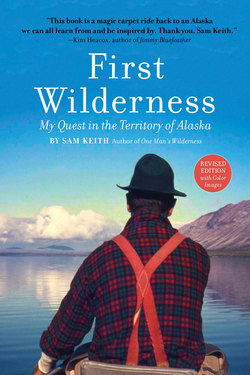Читать книгу First Wilderness, Revised Edition - Sam Keith - Страница 7
На сайте Литреса книга снята с продажи.
ОглавлениеFOREWORD
An Unmet Friend
BY NICK JANS
I never met Sam Keith, but wish I had. His Alaska sojourn ended in 1955, the year I was born, and he arguably had more in common with my father (a fellow child of the Great Depression and a Marine combat veteran of World War II) than I. Yet Sam and I traveled parallel trails, decades apart. We were both young English majors fresh out of back-East colleges, yearning for something more, a wider horizon on which to stretch our dreams. That hope, and our shared, abiding love of the natural world, led us across the continent and northward thousands of miles to Alaska. Neither of us had a fallback plan; half-broke and boxed in, we just went, led by the eternal optimism and inexhaustible energy of youth. And The Great Land proved everything we hoped for, and more. Its sprawling, careless beauty became woven into our being, inseparably twined with the stories of our lives.
Alaska being the almost unimaginably vast state that it is, Sam and I ended up many hundreds of miles apart. But as I read First Wilderness, I can imagine myself alongside Sam on Kodiak Island, pulling long, hard hours working in the company of rough men; catching his first salmon; tagging along with his soon-to-be lifelong friend, Dick Proenneke, on a bear hunt; camping at the mouth of a remote stream as a neophyte fish warden; navigating a stretch of wild Kenai Peninsula rapids in an outboard skiff. The words ring true and vivid. Keith’s writing bursts with exuberance. At its best, it exhibits a crafted, visual style verging on brilliance:
During the next few days, Bruce showed me a flock of sandhill cranes settling in a moose meadow. Some of them almost somersaulted as they landed…. They had an ethereal presence as they rose, wheeling above us like vapors clouding, spreading, thinning, and coming together again. They made a whooping, purring racket that descended upon us.
More often, the writing tends toward sturdy, workmanlike cadences, suited perfectly to the story at hand. Always, the prose is engaging and fast-paced, almost breathless; we sense the raw excitement of young Sam scribbling late at night in his journal or penning letters home, searching for the words to describe a land so wide and deep, and to capture the essence of the people he meets along the way.
Though the narrative revolves around a series of on-the-move adventures set against the backdrop of Alaska’s territorial days, the more profound journey is inward. Above all, First Wilderness is, as the subtitle states, the story of a quest: a young man searching for a direction and purpose in life. Alaska, no matter how alluring, ultimately proves waypoint rather than destination for Sam Keith. We can feel the pull his beloved father, Merle, and sister, Anna, exert, drawing him back to that other world. Throughout the tale, too, the beauty of Alaska competes with Keith’s yearning for feminine companionship. Equally as beguiling as snowcapped peaks are a head-turning beauty on a Seattle bus and a redhead on the Coast Guard base where Keith serves as a civilian construction worker. These connecting threads lend thematic undercurrents that pulse through the book.
Given the distinctly autobiographical perspective, what Sam Keith chose to omit from First Wilderness offers telling insight. There’s not a word about Sam’s experiences as a bomber crewman just a few years earlier; no mention of his being shot down over the trackless ocean and surviving. He seemed to have consciously resisted mining the dichotomy between the destructive power of war and the restorative properties of nature, à la Hemingway, though it offered an obvious and natural theme to explore. Why indeed would a born storyteller avoid so much as a reference to what must have been the most harrowing and dramatic experiences of his life? According to his daughter, Laurel, “I think he simply saw the war as something he had endured and survived. It was in his past and he always wanted to focus on the future.” And truly, that forward-focused optimism brims throughout First Wilderness. Alaska provided a new beginning for Sam Keith, in every sense of the word. He went on from there to find the purpose he yearned for, as an educator, through someone he met in Alaska; and later on, he met Jane, the love of his life, at a home movie showing of his adventures.
Through understated foreshadowing, Keith sustains narrative tension, preparing us for his eventual farewell to Alaska. Close attention to the text hints he clearly sensed his trail diverging from that of Dick Proenneke, whose classic story of solitary wilderness living and self-sufficiency Sam would later carve in One Man’s Wilderness. He seemed to realize that his own destiny lay in the company of others, rather than alone. Throughout the rest of his life, though, Proenneke’s experiences served as a reminder of the trail not followed. Sam and Dick’s long-distance friendship, constantly renewed through hundreds of letters, would keep Alaska welded to his soul. Dick Proenneke was truly both avatar and doppelganger for Sam; no surprise that the two friends passed from this world just weeks apart.
Sam Keith lives on, through his family and those whose lives he touched; and no less so in his enduring contribution to Alaska literature. First Wilderness, this posthumous offering, cements that legacy.
